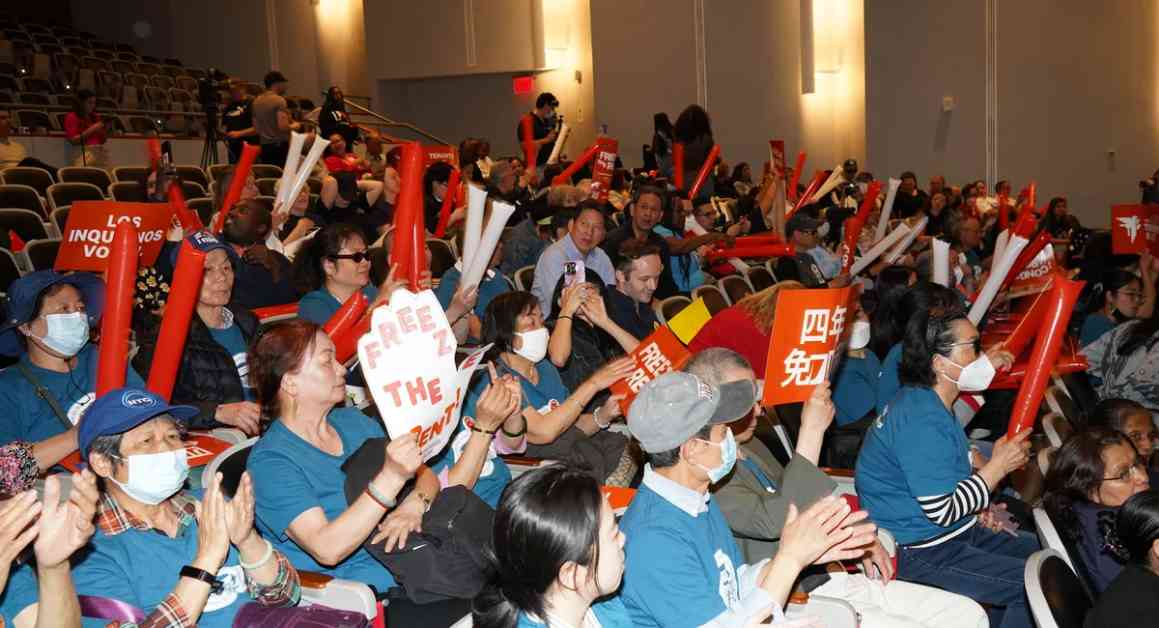The panel that sets rent for tenants in about a million regulated apartments is thinking about bumping up prices by 1.75 to 4.25% on new one-year leases and 4.75 to 7.75% on two-year leases. New York City’s Rent Guidelines Board made the call at a meeting last night. The nine folks on the board use these numbers as a guide before making a final decision in late June. The city will start things off with a public hearing on the proposed increase on May 22 in Manhattan. A bunch of tenants and their supporters showed up at LaGuardia College in Long Island City before the vote. They made noise, chanted stuff, and held signs asking for a rent freeze.
Members on the side of the landlords suggested increases of 6 to 8% on one-year leases and 8 to 9% on two-year leases. Tenant reps were like, “Nah, let’s do a smaller range: 0 to 1.75% on one-year leases and 0 to 3.75% on two-year leases.” The vote last night was just a warm-up, not set in stone. But usually, the final decision falls within the range they talked about, according to what the city has on record. Last year, they decided to up rents by 2.75% after thinking about increases from 2% to 4.5%.
The board, picked by the mayor, has voted to up rents by a total of 9% in the last three years. The members, led by the new Chair Doug Apple, looked at a bunch of reports on tenant and landlord finances and listened to experts before last night’s vote. The reports, put together by the Rent Guidelines Board staff, show that peeps living in rent-stabilized apartments make about $60,000 a year, which is lower than the median in the area. They also spend around 29% of their income on rent. This means about half of the folks in rent-stabilized apartments are what you’d call “rent-burdened.”
Advocates for tenants have been using this data, along with info on inflation and the increasing number of low-income New Yorkers who can get cash help, to push for a rent freeze. The numbers also show that landlords are making more money overall, especially in Manhattan below 96th Street. But in places like Staten Island and some parts of the western Bronx, landlords are actually bringing in less cash.
Building owners say they need a rent hike to cover their own rising costs for maintenance and running the place, especially for the roughly 9% of properties that are in bad shape and might face foreclosure, according to data from the board. This year’s decision from the Rent Guidelines Board is a big deal in the Dem mayoral primary race. At least five Dem candidates want the board to freeze rent. This has only happened three times before, all during Mayor Bill de Blasio’s time in office. Those candidates include Zohran Mamdani, Jessica Ramos, Michael Blake, Brad Lander, Adrienne Adams, Zellnor Myrie, and Scott Stringer.
Tenant groups say this issue will be a game-changer in the mayoral election this year. “Tenants are ready to back candidates who will make their lives better,” said Cea Weaver from the New York State Tenant Bloc. “Freezing rent would give us $600 more a month, so we don’t have to pick between rent and groceries. It’s the best thing the mayor can do to make NYC more affordable. Tenants are the majority here. If Adams won’t freeze rent, we can elect someone who will.”
Mayor Eric Adams, who isn’t running as a Dem, told the press on Monday that the board should think about small property owners’ finances too. Peeps with fewer than 100 rent-stabilized apartments own about 12% of NYC’s rent-stabilized pads, according to a 2022 report by JustFix. After last night’s vote, a spokesperson from City Hall, William Fowler, said asking for a rent freeze is short-sighted. “Sure, it’s easy to yell simple slogans from the sidelines, but the truth is, freezing rent could make buildings fall apart even more,” Fowler said. “Rent stabilization is about stability, for both tenants and their homes. Freezing rent could put buildings in danger and make renters face even bigger hikes in the future.”
Andrew Cuomo, a top candidate in the Dem primary, called demands for a rent freeze a “politically convenient stance” in his housing plan. “If landlords – especially small ones – don’t get rent hikes that match their costs, they won’t be able to keep up their buildings,” the plan said. This story is still developing, so stay tuned for more updates.












